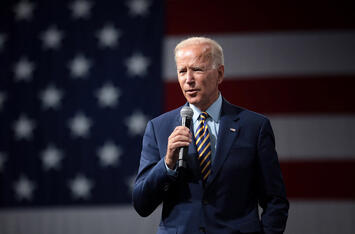
American politics is often said to follow James Carville’s notion that ‘it’s the economy, stupid’. And the economy could well still determine the winner of the 2024 presidential election. Yet in a sharply divided country that is being asked to choose between two awful candidates and two increasingly noxious parties, the current crisis in the Middle East could prove pivotal instead.
The war in Gaza might normally be expected to provide a boost for a sitting president. But Joe Biden is so widely perceived as mentally unfit and ineffective that his poll ratings have not improved with his performance during the Middle East crisis (just as they didn’t during the Ukraine crisis). Even as he seeks a middle ground between supporting Israel’s military actions and the ceasefire demanded by his ‘progressive’ anti-Israel allies, he seems to be pleasing very few. Polling suggests that two in three Americans oppose his handling of the crisis.
Biden’s problems run deep. He is the leader of a party that is both in power and providing the primary source of dissent. Virtually all the Congressional opposition to Israel comes from the Democrats’ left flank, whose influence extends far into the bureaucracies of the state, from Congressional staff to White House officials. Of the 20 representatives who voted against the recent motion to condemn anti-Semitism on college campuses, 19 were Democrats. Democratic voters are similarly inclined, with one in five claiming to side more with Hamas than Israel – this is more than twice as many who claim to side with Hamas among Republican or Independent voters.
There is also a generational aspect to the rise in anti-Israel views. Sympathy for Israel tends to be far higher among conservative and older voters, who remember the Holocaust, at least from their parents’ telling, and usually embrace the Judeo-Christian tradition. Contrast their attitudes with those of younger people, who are notably ignorant about history. Little wonder perhaps that voters under 34 are far more likely to support Palestinians and even Hamas over Israel than older voters.
Remarkably, it’s under a Democratic president, not some imagined white nationalist right-winger, that Jewish people in America feel threatened in ways not seen since the 1930s. Jews are finding colleges and public space in places like New York uniquely hostile. In schools, ‘anti-white’ identity politics has now been extended to justify the murder of Jews. Radicalised teachers, whose unions often take Hamas’s side in the conflict, are working to get even primary-school students to join in protests against Jewish businesses.
This disturbing appeasement of Hamas shows how intersectional ideology allows for alliances that are more than a little contradictory. For example, take the gay and trans activists making excuses for Hamas. With its Islamist fundamentalist worldview, this terrorist organisation seems an odd match for supporters of postmodern gender politics. And non-profits like the Tides Foundation, which supports assorted ‘progressive’ causes, appear to have been bankrolling anti-Israel groups attempting to block US military shipments to Israel. There’s also evidence that ostensibly Jewish, vehemently anti-Israel groups, like Jewish Voice for Peace, are funded not only by the ‘Democratic dark money’ of the Tides Foundation but also by the heirs of the old, historical Judeophobic WASP establishment, like the Rockefellers – a family with history that includes close ties with the Nazis and strong support for early 20th-century eugenics research.
Read the rest of this piece at Spiked.
Joel Kotkin is the author of The Coming of Neo-Feudalism: A Warning to the Global Middle Class. He is the Roger Hobbs Presidential Fellow in Urban Futures at Chapman University and Executive Director for Urban Reform Institute. Learn more at joelkotkin.com and follow him on Twitter @joelkotkin.
Photo: Gage Skidmore, via Flickr under CC 2.0 License.












